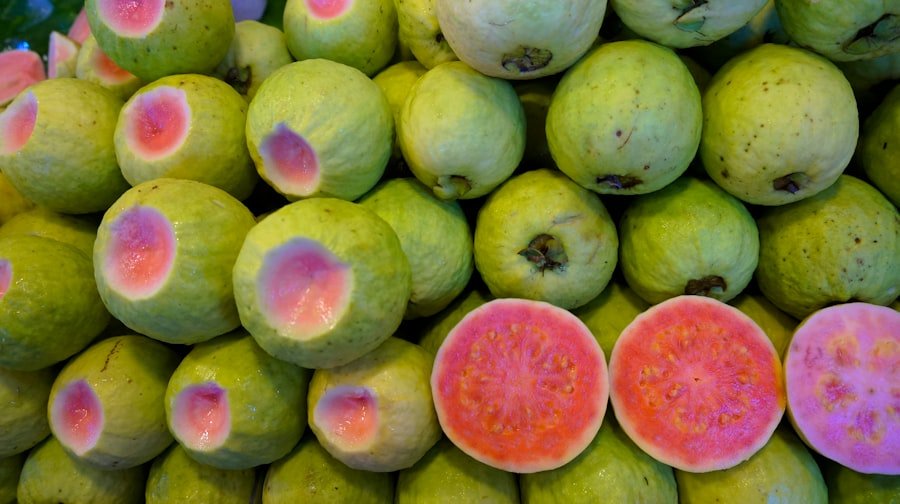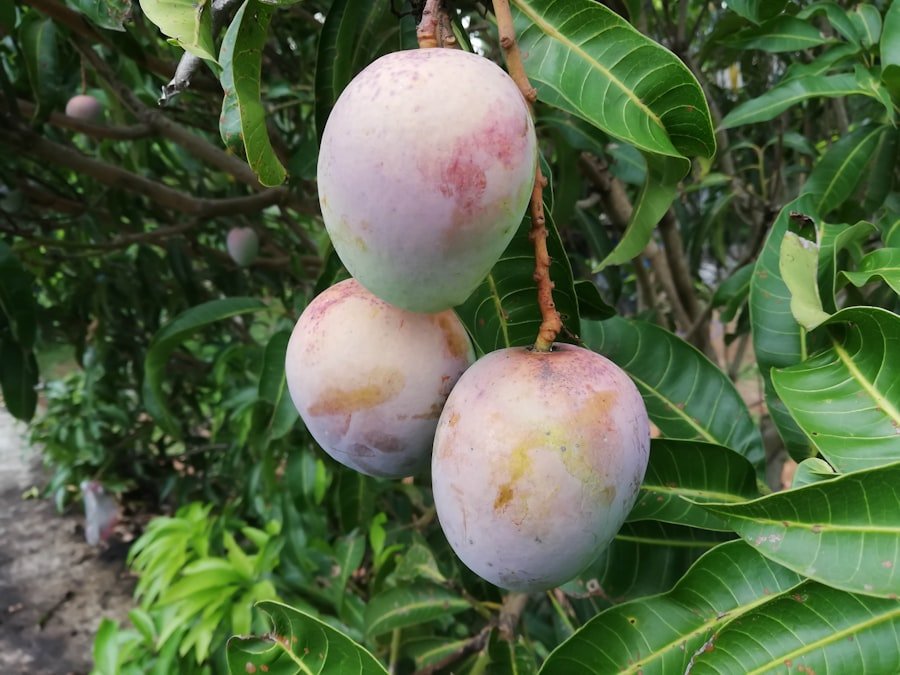Guava, a tropical fruit belonging to the Myrtaceae family, has a rich history that dates back thousands of years. Native to Central America and parts of South America, particularly in regions like Mexico and Peru, guava has been cultivated for its sweet and aromatic flavor since ancient times. The fruit was introduced to other parts of the world through trade routes and exploration, eventually making its way to Asia, Africa, and the Caribbean.
The Spanish and Portuguese explorers played a significant role in spreading guava to various regions, where it adapted to local climates and cultures, leading to the development of numerous varieties. The flavor of guava has been celebrated in various cultures, often associated with tropical paradises and exotic landscapes. In many indigenous communities, guava was not only a food source but also held cultural significance.
It was used in rituals and traditional practices, symbolizing abundance and fertility. Over time, guava flavor became integrated into local cuisines, evolving into a beloved ingredient that transcended its geographical origins. Today, guava is recognized not just for its taste but also for its versatility in culinary applications, making it a staple in many households around the globe.
Key Takeaways
- Guava flavor has a rich history, originating in Central America and the Caribbean before spreading to other tropical regions.
- The unique taste profile of guava is both sweet and tangy, making it a versatile ingredient in a wide range of culinary creations.
- Guava flavor adds a tropical twist to culinary delights such as salads, salsas, and marinades, enhancing the overall flavor profile.
- Guava flavor is a popular choice in beverages, including juices, smoothies, cocktails, and even craft beers, adding a refreshing and exotic element.
- Guava flavor is a favorite in desserts and sweets, from jams and jellies to pastries and ice creams, offering a delightful tropical sweetness.
The Unique and Versatile Taste Profile of Guava
Guava’s flavor profile is a delightful amalgamation of sweetness and tartness, often described as a cross between a pear and a strawberry. This unique combination makes guava an intriguing ingredient in various culinary contexts. The flesh of the fruit can range from pale yellow to deep pink, with the color often indicating the intensity of its flavor.
Ripe guavas are typically sweet with a hint of acidity, while unripe ones can be quite tart, offering a different taste experience altogether. The versatility of guava extends beyond its basic flavor; it can be enjoyed fresh, juiced, or cooked. When eaten raw, the fruit’s crisp texture and aromatic qualities shine through, making it a refreshing snack.
In contrast, when cooked or pureed, guava can develop deeper flavors that enhance both sweet and savory dishes. This adaptability allows chefs and home cooks alike to experiment with guava in various forms, from sauces to marinades, showcasing its ability to complement a wide range of ingredients.
Guava Flavor in Culinary Delights

In the culinary world, guava has carved out a niche for itself as an ingredient that can elevate dishes with its distinctive flavor. In Latin American cuisine, for instance, guava is often used in traditional dishes such as “guava paste,” which is made by cooking down the fruit with sugar until it reaches a thick consistency. This paste is commonly paired with cheese or used as a filling in pastries, creating a delightful contrast between the sweet guava and savory elements.
In Asian cuisines, particularly in countries like Thailand and the Philippines, guava is frequently incorporated into salads and salsas. The fruit’s refreshing taste pairs well with spicy ingredients, adding a layer of complexity to dishes. For example, a Thai salad might feature guava alongside shrimp, herbs, and a tangy dressing, showcasing how the fruit can balance bold flavors while contributing its own unique essence.
Chefs around the world continue to explore innovative ways to incorporate guava into their menus, whether through fusion cuisine or traditional recipes.
Guava Flavor in Beverages
| Product | Guava Flavor Intensity | Customer Rating |
|---|---|---|
| Guava Juice | Strong | 4.5/5 |
| Guava Smoothie | Moderate | 4/5 |
| Guava Soda | Mild | 3.5/5 |
Guava’s vibrant flavor makes it an ideal candidate for beverages, ranging from juices to cocktails. In many tropical regions, fresh guava juice is a popular refreshment, often enjoyed on its own or blended with other fruits like mango or pineapple. The natural sweetness of guava allows for minimal added sugar, making it a healthier alternative to many commercial fruit drinks.
In mixology, guava has gained popularity as a cocktail ingredient due to its ability to pair well with various spirits. Bartenders often use guava puree or juice to create tropical cocktails that evoke a sense of paradise. For instance, a guava mojito combines fresh mint, lime juice, rum, and guava puree for a refreshing twist on the classic drink.
Additionally, guava-flavored syrups are increasingly used in coffee shops to create unique lattes and iced beverages, further expanding its presence in the beverage industry.
Guava Flavor in Desserts and Sweets
The sweet and aromatic qualities of guava make it an excellent choice for desserts and sweets. In many cultures, guava is transformed into jams and jellies that capture its essence in a spreadable form. These preserves are often enjoyed on toast or as fillings for pastries and cakes.
The natural sweetness of guava lends itself well to dessert applications without overwhelming other flavors. In addition to jams, guava is frequently used in puddings and ice creams. A popular dessert in some Latin American countries is “guava flan,” where the creamy custard is infused with guava puree, resulting in a rich and flavorful treat.
Similarly, guava sorbet offers a refreshing option during hot weather, allowing the fruit’s natural flavors to shine through without heavy cream or added sugars. The versatility of guava in desserts showcases its ability to adapt to various culinary traditions while maintaining its unique flavor profile.
Guava Flavor in Savory Dishes

While guava is often associated with sweet applications, its flavor can also enhance savory dishes remarkably well. In Caribbean cuisine, for example, guava is sometimes used in marinades for meats such as chicken or pork. The fruit’s natural sugars caramelize during cooking, creating a delicious glaze that complements the savory elements of the dish.
A popular dish might include grilled chicken marinated in a mixture of guava juice, garlic, and spices, resulting in a flavorful meal that highlights the fruit’s versatility. In Asian cooking, particularly in Thai cuisine, guava can be found in stir-fries or curries where it adds a subtle sweetness that balances spicy flavors. A Thai curry might incorporate chunks of ripe guava alongside vegetables and protein sources like tofu or shrimp.
The fruit’s texture holds up well during cooking, providing both flavor and visual appeal to the dish. This ability to bridge sweet and savory elements makes guava an invaluable ingredient for chefs looking to create complex flavor profiles.
Health Benefits of Guava Flavor
Beyond its delightful taste, guava offers numerous health benefits that contribute to its appeal as a flavorful ingredient. Rich in vitamins A and C, guava supports immune function and skin health while providing antioxidants that combat oxidative stress in the body. The high fiber content found in guava aids digestion and promotes gut health by supporting regular bowel movements.
Moreover, studies have suggested that consuming guava may help regulate blood sugar levels due to its low glycemic index. This makes it an excellent choice for individuals looking to manage their weight or those with diabetes. The presence of phytochemicals such as flavonoids further enhances guava’s health benefits by potentially reducing inflammation and lowering cholesterol levels.
Incorporating guava into one’s diet not only adds flavor but also contributes positively to overall health.
Guava Flavor in Traditional Medicine
In various cultures around the world, guava has been utilized for its medicinal properties long before modern science validated its benefits. Traditional medicine systems often employ different parts of the guava plant—leaves, bark, and fruit—for their therapeutic effects. For instance, in Ayurvedic medicine, guava leaves are brewed into teas believed to aid digestion and alleviate gastrointestinal issues.
In folk medicine practices across Latin America and Asia, guava has been used to treat ailments such as diarrhea and respiratory infections. The leaves are sometimes crushed and applied topically for their anti-inflammatory properties or brewed into infusions that are consumed for their health benefits. This historical use underscores the deep-rooted connection between food and medicine within various cultures and highlights how flavors like that of guava can play significant roles beyond mere culinary enjoyment.
Guava Flavor in Skincare and Beauty Products
The benefits of guava extend into the realm of skincare and beauty products as well. Rich in antioxidants and vitamins C and E, guava extracts are increasingly being incorporated into cosmetics due to their potential skin-enhancing properties. These nutrients help combat signs of aging by promoting collagen production and improving skin elasticity.
Guava oil is also gaining popularity as an ingredient in moisturizers and serums because of its hydrating properties. Its natural antibacterial qualities make it suitable for acne-prone skin as well. Many beauty brands have begun formulating products that harness the power of guava extract or oil to provide consumers with effective skincare solutions that are both nourishing and fragrant.
Guava Flavor in Fragrances and Perfumes
The aromatic profile of guava has not gone unnoticed by the fragrance industry; its sweet yet slightly tangy scent lends itself beautifully to perfumes and scented products. Guava notes are often blended with other tropical fruits or floral elements to create fragrances that evoke feelings of warmth and exoticism. These scents are particularly popular during warmer months when consumers seek refreshing fragrances that transport them to sun-soaked beaches.
Perfume houses have embraced guava as a key note in many contemporary fragrances aimed at evoking feelings of joy and vitality. The fruit’s scent can be found in both women’s and men’s fragrances alike, showcasing its universal appeal. As consumers increasingly seek out unique scent profiles that stand out from traditional floral or musky notes, guava continues to gain traction as an ingredient that adds freshness and vibrancy to perfumes.
Exploring the Global Appeal of Guava Flavor
The global appeal of guava flavor is evident in its widespread use across diverse culinary traditions. From Latin America to Asia and beyond, this tropical fruit has found its way into countless recipes that celebrate its unique taste profile. Its adaptability allows it to be embraced by various cultures while still retaining its distinct characteristics.
As globalization continues to influence food trends, the popularity of guava is likely to grow even further. Chefs around the world are increasingly experimenting with this versatile ingredient, incorporating it into fusion dishes that blend different culinary styles while highlighting the fruit’s inherent qualities. Whether enjoyed fresh or transformed into sauces, beverages, or desserts, guava flavor resonates with people from all walks of life—making it not just a fruit but a symbol of culinary creativity and cultural exchange on a global scale.
FAQs
What is guava flavor?
Guava flavor refers to the taste and aroma that is characteristic of the guava fruit. It is often described as a combination of sweet and tangy with tropical notes.
How is guava flavor used?
Guava flavor is commonly used in the food and beverage industry to add a tropical and fruity taste to products such as juices, smoothies, candies, and desserts. It is also used in the production of flavored water, cocktails, and alcoholic beverages.
Is guava flavor natural or artificial?
Guava flavor can be both natural and artificial. Natural guava flavor is derived from real guava fruit, while artificial guava flavor is created using synthetic compounds to mimic the taste of guava.
What are the health benefits of guava flavor?
Guava flavor, derived from the guava fruit, contains essential nutrients such as vitamin C, fiber, and antioxidants. These nutrients can contribute to overall health and well-being.
Are there any allergens associated with guava flavor?
Individuals with allergies to guava fruit should be cautious when consuming products with guava flavor. Additionally, some guava flavorings may contain allergens such as soy or gluten, so it is important to check product labels for allergen information.

